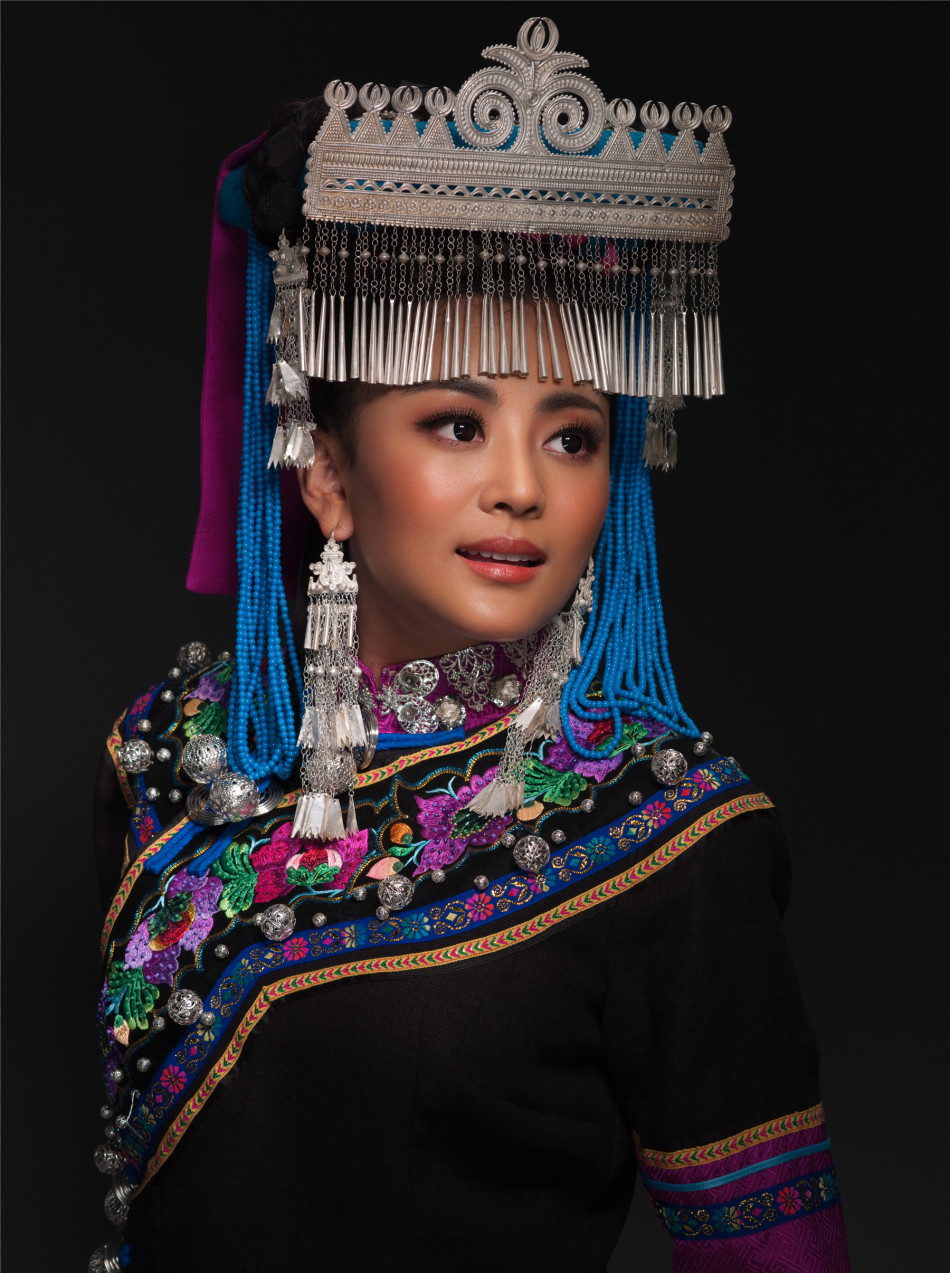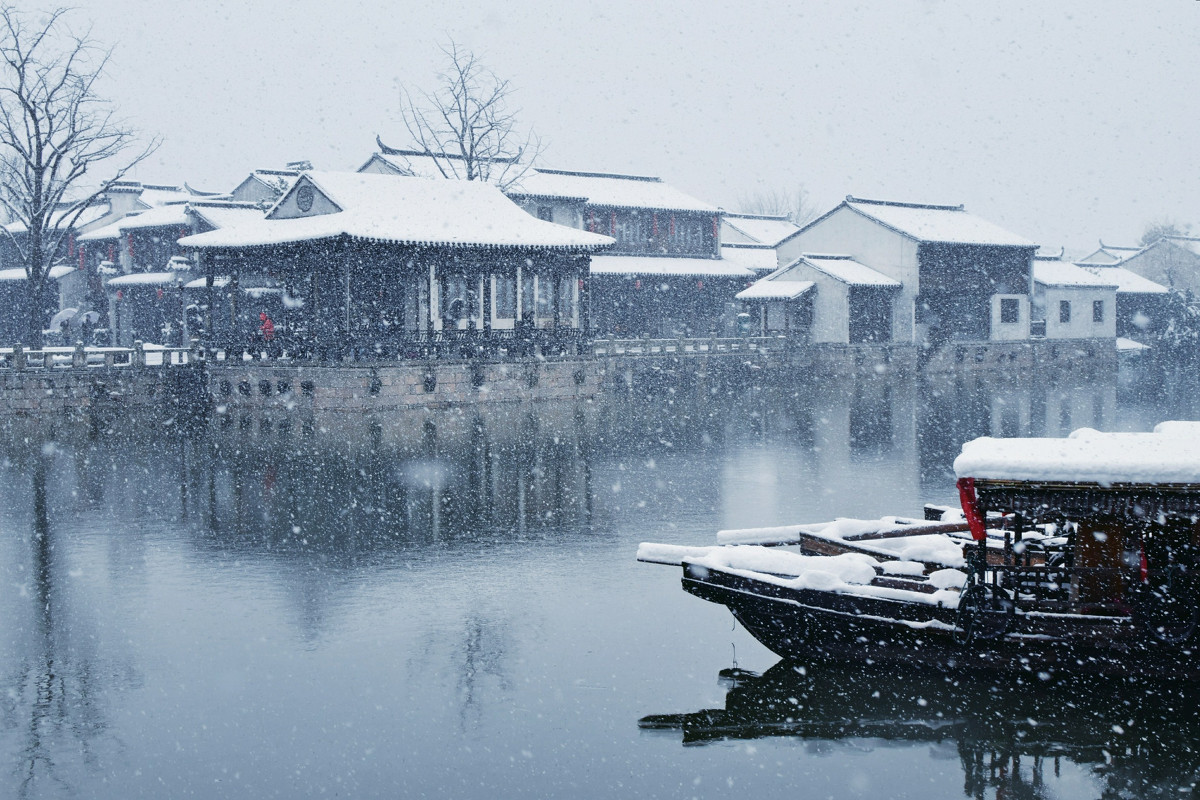






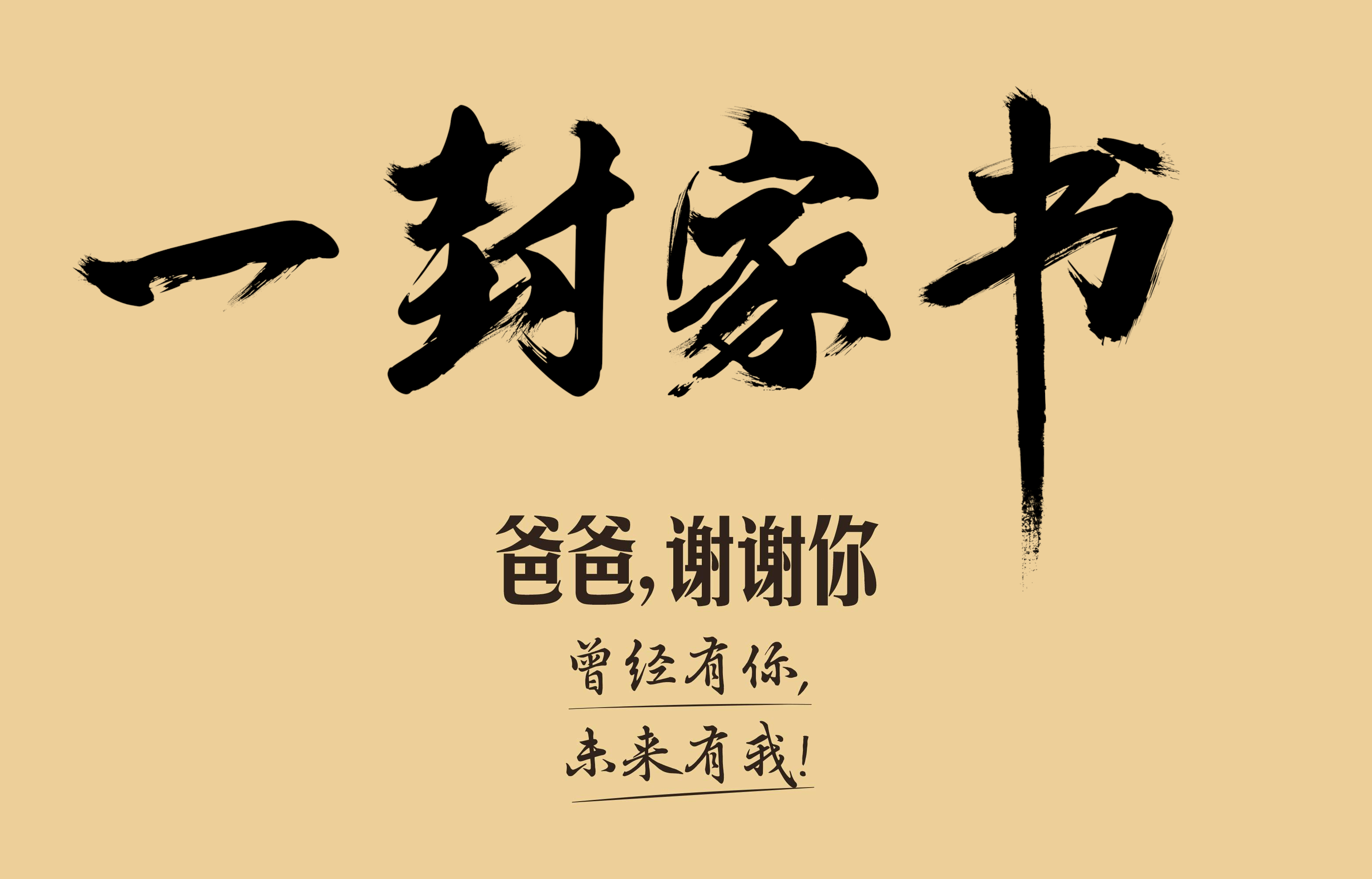
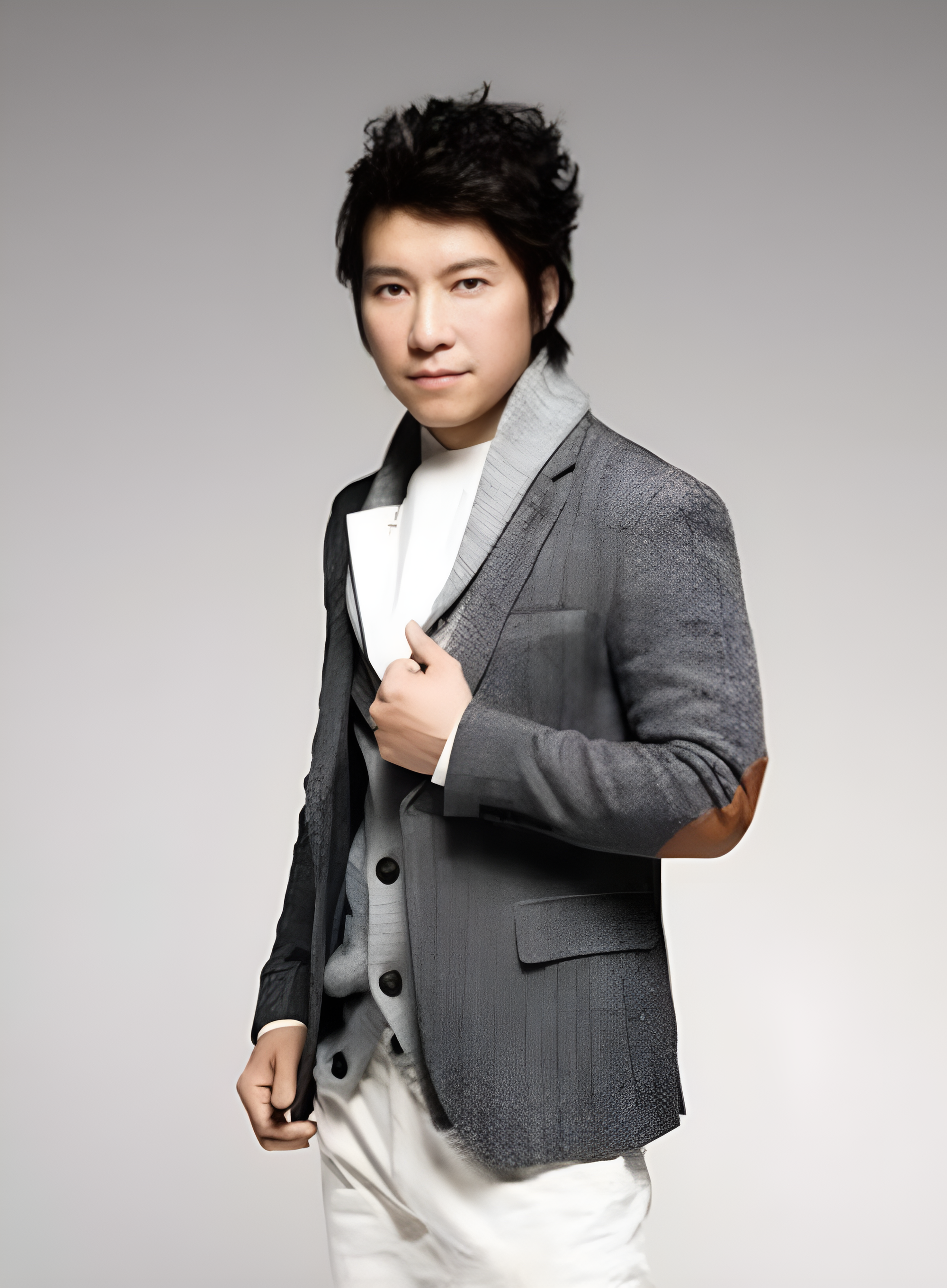


仁:仁者,人人心德也。心德就是良心,良心即是天理,乃推己及人意也。所以仁字,从二人相处,因为人不能离群而独存,别人之观念立,人之人格显,方能雍容和谐,以立己立人,发挥老吾老幼吾幼之怀抱,以及己所不欲,勿施于人,事物为人,而不为己,发为恻隐之心,宽裕温柔,仁也。
义:义者,宜也,则因时制宜,因地制宜,因人制宜之意也。所当做就做,不该做就不做。见得思义,不因果滥取不义之财物。子曰:「君子喻於义,小人喻於利,不义而富且贵,於我如浮云。」所以人发为羞恶之心,发为刚义之气,义也。
礼:礼者,说文:礼,履也,所以事神致福也。释名:礼,体也,得其事证也,人事之仪则也。进退周旋得其体,乃是正人身之法也。尊卑长幼有序,处事有规,淫乱不犯,不败人伦,以正为本,发为恭敬之心,斋庄中正之态,礼也。
智:智者,知也,无所不知也。明白是非、曲直、邪正、真妄,即人发为是非之心,文理密察,是为智也。
信:信者,信字从人言,言非曰,乃有定之文也,以今之概念定义可解为“学说”、“思想”。信与知对立,知宜者唯宜以行,不知宜者从他人言而信,进而守礼以近仁。因此言:必信者无义。
孔子曾将“智仁勇”称为“三达德”,又将“仁义礼”组成一个系统,曰:“仁者人(爱人)也,亲亲为大;义者宜也,尊贤为大;亲亲之杀,尊贤之等,礼所生焉。” 仁以爱人为核心,义以尊贤为核心,礼就是对仁和义的具体规定。
孟子在仁义礼之外加入“智”,构成四德或四端,曰:“仁之实事亲(亲亲)是也;义之实从兄(尊长)是也;礼之实节文斯二者是也;智之实,知斯二者弗去(背离)是也。” “性善说”,曰:“恻隐之心,人皆有之;羞恶之心,人皆有之;恭敬之心,人皆有之;是非之心,人皆有之。恻隐之心,仁也;羞恶之心,义也;恭敬之心,礼也;是非之心,智也。仁义礼智,非由外铄我也,我固有之也,弗思耳矣。” (《孟子·告子上》)
董仲舒又加入“信”,并将仁义礼智信说成是与天地长久的经常法则(“常道”),号“五常”。 曰:“夫仁、谊、礼、知、信,五常之道。”(《举贤良对策一》)
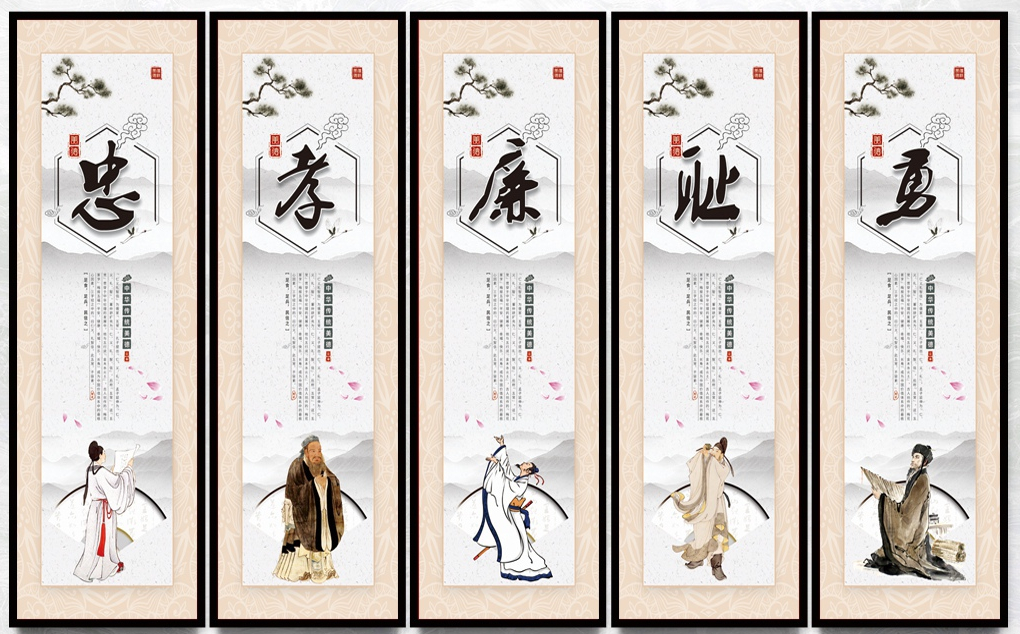
忠者:
赤诚无私 尽心竭力于职责为忠也。古人云:忠者,人格之成也。人无忠则凶,专一之忠为小忠,无逆之忠为中忠,大忠之忠要求忠于道。对社会、国家、事业不存懈怠,不玩忽职守,鞠躬尽瘁,死而后己,先天下忧而忧,后天下之乐而乐。为人要忠诚、忠实厚道,坚贞梗直,竭忠尽心,做忠良之人。
孝者:
善事父母为孝,百善孝为先。故圣人云:孝者,德之基,人格之始也。
廉者:
廉为不义财不取也。清廉正直、廉正公平、清白高洁、洁身谨慎、不苟取,不贪污。 古人云:君子爱财,取之有道,廉生威、威生明、明生信。常言道:威武不屈,贫贱不移,富贵不淫。汝廉乎?
耻者:
羞耻之心,亦羞耻之能力也。羞愧、羞辱、羞耻侮辱,违纪违法和侵害他人权益为耻辱,人非圣贤,孰能无过,过而知耻,继而改之,焉能为君子矣。恭近于礼远耻辱,无以利害义,则耻辱亦无至矣。汝能知耻否?
勇者:
勇者无惧,但是,不要有勇无谋!
忠心、孝悌、廉洁、羞耻、勇敢。指的是人应信守、践行的五种高尚品格。品德之于品性,侧重的是德性,更多的是对人的为人处世原则的概定;品性之于品格,侧重的是性情,更多的是对人的自我性情秉持的概定;品格之于品德,侧重的是风格、人格,更多的是对人的持家理政风格、人格的概定。
过去,人们往往以“缺德”来作为对人最贬恶的评价。伴随着社会、意识和观念的日异更新,富裕的日益亲近和贫穷的渐行渐远,评价体系也早已作了根本意义上的改弦更张,并达到了空前的一致和统一。所以,该题目之近的话题也懒得提起了,只有那些不开化者有时还念念不忘。这不,之前既然有了德之系——温良恭俭让和和德之续——仁义礼智信,在此基础上就再来个三:德之扬——忠孝廉耻勇,就此了结此德篇。
其实,这忠孝廉耻勇于那仁义礼智信和温良恭俭让并无一二三之分,只是我在这里分个说话的顺序而已,诸如这些方方面面,都是一个相互联系相互渗透相互影响相互制约的统一体,其完整性自然是十分突出的,进而集中到一点上,也是十分有特点的。
忠,忠诚、忠良、忠恕、忠真。诚然,目的者往往把忠放在一个十分重要的地位来推崇,其结果和过程更是一目了然。文化的熏陶更把其推上一个个的骄人高度,并人为地展现和刻画出一片片的耀眼光彩。所谓“天下兴亡匹夫有责”、“精忠报国舍生取义”等等壮举,无不构成一幅幅扣人心弦的壮丽画面。这忠,无论其针对的对象为谁,所起的作用都是十分巨大和不可估量的。
孝,孝敬、孝道、孝心、孝行。一提这孝,人们首先想到的就是孝敬父母。这一点,无论就其动物的自然属性还是人们的社会属性,本人认为其分歧度相对最小。至于那些“忠孝不能两全”、“孝乃德之本”、“百善孝为先”之类的说辞,还是赞成具体情况具体分析具体对待。只是在利益面前,许许多多的行为与孝本的矛盾甚至背道而驰都在既成事实也是在所难免的。
廉,廉洁、清廉、廉正、廉明。不说也知道,这廉具有特重要的总结意义、现实意义和极深远的历史意义。洁身自好、不苟且不贪腐,早已成为人们向往的理想。廉生威、威生明、明生信,君子爱财、取之有道,威武不屈,贫贱不移,富贵不淫,汝廉乎?
耻,耻辱、羞耻、惭愧、耻污。知耻者慎行,知违者不羁。害人者为己不得善身,侵权者为人不得善终。人非圣贤,孰能无过,过而知耻,继而改之,焉能为君子矣。恭近于礼远耻辱,无以利害义,则耻辱亦无至矣。故知廉耻,完其生。
勇,勇敢、坚强、刚毅、勇猛。在词义中,勇虽于智相对,但绝不矛盾。这勇,在此也是能力的意思,所以也就包含有综合性的素质在里面,因而则生敢想、敢干、敢说、敢为并开拓、创新、承担、坚持诸项,其自强不息、英勇顽强百折不挠的特色就十分突出,应了那句:“有志者,事竟成”。
忠孝廉耻勇,一担轻为重。知会现代人,思思老祖宗。应应千年梦,何收其大同。只是善作念,始本恶为终。 (Quelle:http://www.cnjishi.com.cn/)

把你的倩影画在家乡的山顶
甜蜜的笑容定格在我心里
深情的歌声描绘你的美丽
只为让你永驻我心里
我用爱画一个温柔可爱的你
让我在梦中无数次见到你
梦你的夜晚我不愿醒来
只为把你画在我心里
画上你的美丽
只为把你画在我心里
把你的倩影画在故乡的山间
幸福的笑容定格在我心里
把你的温柔画成那小河
爱情的泉水永流我心里
我用情画一个俊俏可爱的你
用爱的心愿描绘最爱的你
梦你的时候我不愿醒来
我用一生守护着你
画上你的美丽
我用一生守护着你
画上你的美丽
我用一生守护着你
我用一生守护着你



Dominio de Pingus is a Spanish winery located in Quintanilla de Onésimo in Valladolid province with vineyards in La Horra area of the Ribera del Duero region. The estate's flagship wine, Pingus, is considered a "cult wine", sold at extremely high prices while remaining very inaccessible,[1][2] and commands an average price of $811 per bottle.[3]
The winery also produces a second wine, Flor de Pingus, and a special cuvée, Ribera del Duero "Amelia". Recently, Dominio de Pingus has founded a joint project with local grape producers to make an old vine tempranillo called "PSI".
Dominio de Pingus was established in 1995 by Danish oenologist Peter Sisseck, also manager of the Pesquera de Duero estate Hacienda Monasterio.[4] On the estate's winemaking philosophies, Sisseck has stated, "The vines in my plots are very old. They have never been fertilised nor treated with pesticides and all grow following the traditional en vaso system. They are perfect."[4]
About the first 1995 vintage of Pingus, Robert Parker declared, "One of the greatest and most exciting wines I have ever tasted".[5] With a very limited first vintage production, only 325 cases were made with prices initially set at US$200 per bottle, it became yet more scarce when in November 1997 the ship transporting a U.S. bound shipment of 75 cases disappeared somewhere off the Azores in the North Atlantic Ocean.[6] The shipwreck resulted in a dramatic reaction in the US market, with prices soon rising to $495 per bottle.[5][6]
At the Ronda WineCreator conference of April 2008, Sisseck was angered by suggestions by Decanter editor Guy Woodward that some winemakers make wines to suit the palates of certain critics. In response he called Woodward's remarks arrogant for implying winemakers do not have their own opinions, adding, "I don't even think it is possible to do this."[7]
In 2007 it was announced that the Spanish government had approved plans to expand highway roads through the vineyards of Dominio de Pingus and other wineries, which was met with strong opposition by Sisseck who called it a "vengeful measure".[8]
Planted with very old vines of Tinto Fino, i.e. Tempranillo, the vineyards are 2.5 hectares (6.2 acres) in Barrosso with vines exceeding 65 years and 1.5 hectares (3.7 acres) in San Cristobal with vines older than 70 years, and the unusually low average yield of 12 hL per hectare. Since 2000, the viticulture has been biodynamic. Of the annual production of Pingus there is typically less than 500 cases, though in poor vintages no Pingus is made.
The production of the second wine Flor de Pingus, also 100% Tempranillo, is made with fruit from rented vineyards in the La Horra zone, with vines older than 35 years. Since the 2005 vintage, the viticulture has been biodynamic. The annual production is on average 4,000 cases.
Additionally there has been the single barrel cuvée, Ribera del Duero "Amelia", made from a vineyard parcel of 100+ year old vines with an average yield of 10 hL per hectare, with biodynamic viticulture since its initial 2003 vintage. The 2005 vintage had a production of 25 cases.
"PSI" is a joint project based on fruit produced by local grape growers from old tempranillo vines. The goal is to help grape producers and save old vines. Project was founded in 2006, first vintage was 2007. Grape growers are encouraged to employ biodynamic or organic vineyard management practices. The wine is made by Peter Sisseck and Pablo Rubio and sold under producer name Bodegas y Viñedos Alnardo. Vinification takes place in large concrete vats and aging in concrete and wooden tanks and oak barrels. Production of PSI 2009 was 9,600 cases, PSI 2010 was 16,600 cases.


